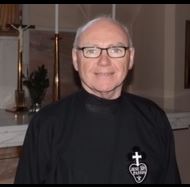I worked in the Olivetti factory in Queenslie from 1970-1975, at which time I left to join the Passionists. I was a cost accountant and I worked with a great group of people in the office, including our boss who, as an accountant and as a human being was top class. I had only been there a few months when myself and this boss had to go into town for some meeting or other, my memory of where it was and what it was about is a bit vague. What I remember clearly is the journey back when we went to Queen Street Station to catch a train. We were cutting it fine and at the end had to run along the platform as the train was getting ready to pull out. As we ran, I was aware of my boss dropping something which then seemed to bounce back up off the platform and straight into his hand without him breaking stride. When we leaped onto the train and took seats opposite each other, trying to catch our breath, I looked up and saw him inserting his glass eye back into its socket. Until that moment I hadn’t realized that he wore a glass eye, and I understood then what he had dropped and caught on the platform. Ever since it has given me a new understanding of the phrase “catching your eye”.
Thinking about “catching your eye”, when I was living in Dublin, one of my rituals whenever I returned home was to go for a walk around the west end where I was born and grew up, and also to saunter down Clydeside to the docks where my father had worked as a time keeper for the Anchor Line shipping company. The west end of Glasgow remains one of my favourite places. Just before I left St. Mungo’s in 1986 I gave a solo mission in St. Simon’s, Partick, the parish where I had served on the altar for years as a child, and just about everyone who came to the mission regaled me with stories and memories that I treasure to this day.
At one of the mission sessions a man caught my eye and seemed to observe me suspiciously throughout. He approached me afterwards and interrogated me; then, having firmly
established my lineage and making a comment or two on my preaching; he proceeded to ask about my mother, then retired, my older brother Hugh, who at that time was writing for The Scotsman, and finally about my younger brother Patrick, who was working for National
Savings. He then held my eye for a bit longer, before saying, “Aye, Ah kent yir faither”.
Now, as we all know in Scotland, when someone tells you he kent yir faither, you know you are being advised, in no uncertain terms, not to get above your station, not to form any high
opinions about yourself, and not to forget the humble roots you came from. It’s a national trait to have a certain ambivalence towards anyone who does reasonably well for themselves. On the one hand you might feel quite proud of the local boy or girl who did well, but on the other hand you have to be suspicious of them until you satisfy yourself they’ve remained humble and ordinary. The only reply I could think of to make to my interrogator, on behalf of myself and my brothers, was “Aye, Ah know ye did”. I hope that satisfied him.
One of the ways I like to think about God is that God is always trying to catch my eye. God is in all things if only I would notice. I think of Moses on the hillside noticing the burning bush, and when he approaches it he takes off his sandals because he realises that he is standing on Holy Ground, that he is in the presence of the living God. How often am I standing on Holy Ground without even realising? I think too of that wonderful description of prayer as “looking at God, looking at me, lovingly” God catching my eye, me catching God’s eye, in a gaze of love. How often in the Gospels does Jesus open eyes that we might see? And, of course, our God is the God who guards us as the pupil of his eye. In the words of an old hymn:
O soul, are you weary and troubled? No light in the darkness you see? There’s light for a look at the Saviour, and life more abundant and free! Turn your eyes upon Jesus, look full in his wonderful face; and the things of earth will grow strangely dim, in the light of his glory and grace

 RSS Feed
RSS Feed
